This website uses cookies. By continuing to browse the site, you are agreeing to our use of cookies
Understanding the Elements of Workforce Compensation in Oracle HCM Cloud
Enterprise Platform Services
September 20, 2018
The latest buzz words that we hear in the enterprise world are automation, real-time data, insightful reports etc. In this modern digital world, organizations must actively look for IT solutions that provide the above aspects and ensure they thrive in complex and dynamic environments. To satisfy their external and internal customers (employees), they need business agility and rapid decision making.
Unfortunately, we see a lot of organizations still relying on manual methods for their internal processes, especially HR. They use excel sheets and ad hoc methods for implementing various HR functions which lead to higher costs and operational inefficiencies. The HR professionals tend to fail in meeting the expectations of the employees. This could have a significant impact on the organization’s workforce in the long run.
If your current organization is facing similar situations, it is high time to look for a sustainable product that would enable you to achieve cost saving, timely completion of HR processes and improve your employees’ performance. In this regard, Oracle HCM Cloud seems to be one of the best offerings in the market. It is an enterprise-grade cloud computing solution for HR which has various modules such as talent management, workforce rewards, HCM analytics etc. Since we don’t have the feasibility to go through all the modules here, we will deep dive into Workforce rewards module to understand the various functionalities and features that the product has to offer.
In general, employees expect the organization to reward them fairly and carry out compensation-related processes in a transparent manner. From the organization perspective as well, you want to have standardized procedures to be followed throughout and ensure the processes are completed in a timely fashion. Oracle made its best effort to keep these in mind while designing the Oracle Workforce compensation module.
Manage total compensation globally
Oracle Workforce compensation module provides the users with an intuitive UI and faster way to allocate compensation across a group of employees irrespective of which department/location/BU/divisions/currency they belong to. The module also offers a comprehensive view of all the components of pay such as merit /promotion increase, bonus, and incentives. Multicurrency feature supports global operations where employees can view their compensation in corporate currency, local currency or any chosen/preferred currency. Adding to the above features, embedded analytics give the feasibility to compare budgets, pay history and other industry makers like compa-ratio, position-in-range, etc.
Standard processes and common compensation strategy
The module has various roles such as a compensation administrator, a compensation manager, etc. These roles assure accountability and the presence of appropriate control mechanisms over compensation. The administrators have the ultimate control over the configurations – creating plans, initiating cycle, eligibility rules, targets and budgets, allocation guidelines, etc. The allocation guidelines can be based on one or more criteria and can be enforced through a series of alerts sent to the line managers. Alerts are of three types – Warning, Error, and Information; they make sure the managers adhere to the organization’s policies. Furthermore, the alerts are analyzed to ensure the cycle ends within the planned time.
Implementing compensation strategy
Compensation plans are set up in two different ways – the first one is through the Workforce Compensation Plan which is usually the compensation cycle which runs at regular intervals on a selected group of employees. On the other hand, we have Individual Compensation Plan which awards compensations like spot bonus, education reimbursement, etc. to an individual employee outside the regular compensation cycle. Once the plans are set up, we must allocate budget pools which can be done in three ways – by running the compensation cycle process, by using manual allocation or by modelling.

Modelling allows managers/administrators to automatically allocate compensation for a given employee population who meets certain pre-defined criteria. The models can also be applied to budget amounts, target amounts and target ranges. The option to create models is usually enabled for managers/administrators depending on the organization’s requirement. There are different allocation methods used in modelling – allocate/increase by a specified amount/percentage, bring employees to a specific compa-ratio or quartile. After building the models, we have preview functionality to view the results before applying the model. Finally, once the line managers give their inputs and subsequent
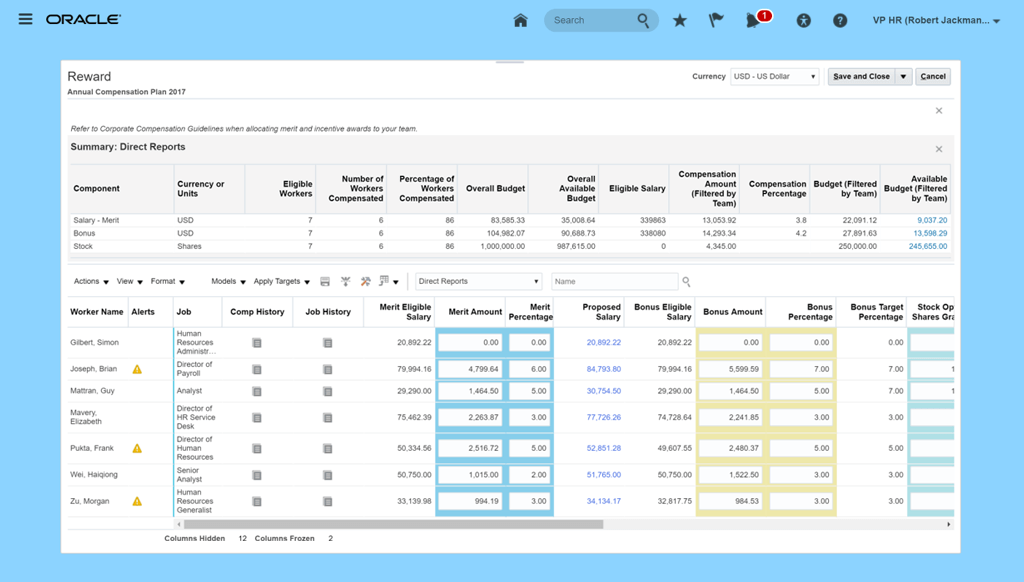
approvals are done, the system updates the new salary, adds new components and passes them to the payroll interface.
Implementing compensation strategy
-
Embedded Analytics and Reports:
With the aid of built-in analytics, we can quickly analyze the plans, budgets, and models across the organization with minimal efforts. Oracle Transactional Business Intelligence (OTBI) can be used to configure real-time reports for managers to refer during the compensation cycle. Another useful feature implemented in reports is dimensions. They are attributes that help to group the data in reports and serve as criteria while building models. We can enable the dimensions that make sense to the organization within the context of the compensation plan.
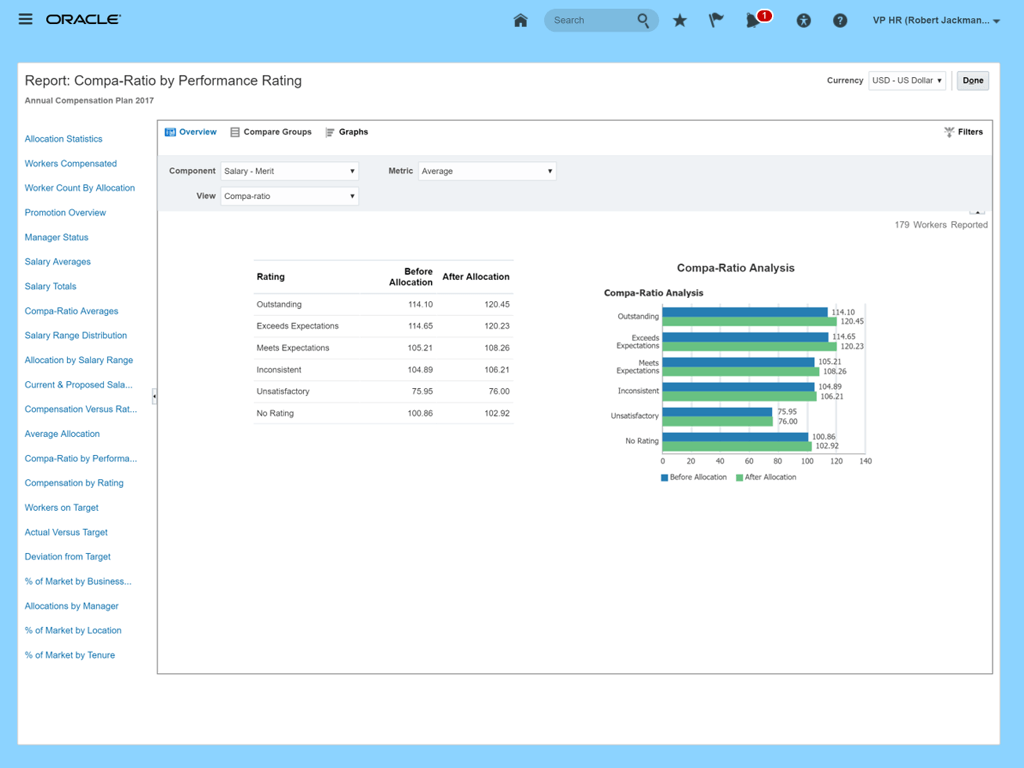
-
Seamless integration with other modules:
In addition to the above-discussed functionalities, Oracle workforce cloud provides a complete solution by automatically pushing all the changes to modules like Global HR and Payroll. It also provides real-time performance updates through out-of-the-box integration with Oracle Performance Management. In case of custom integration with other sources, they can be managed using the Oracle HCM Data Loader.
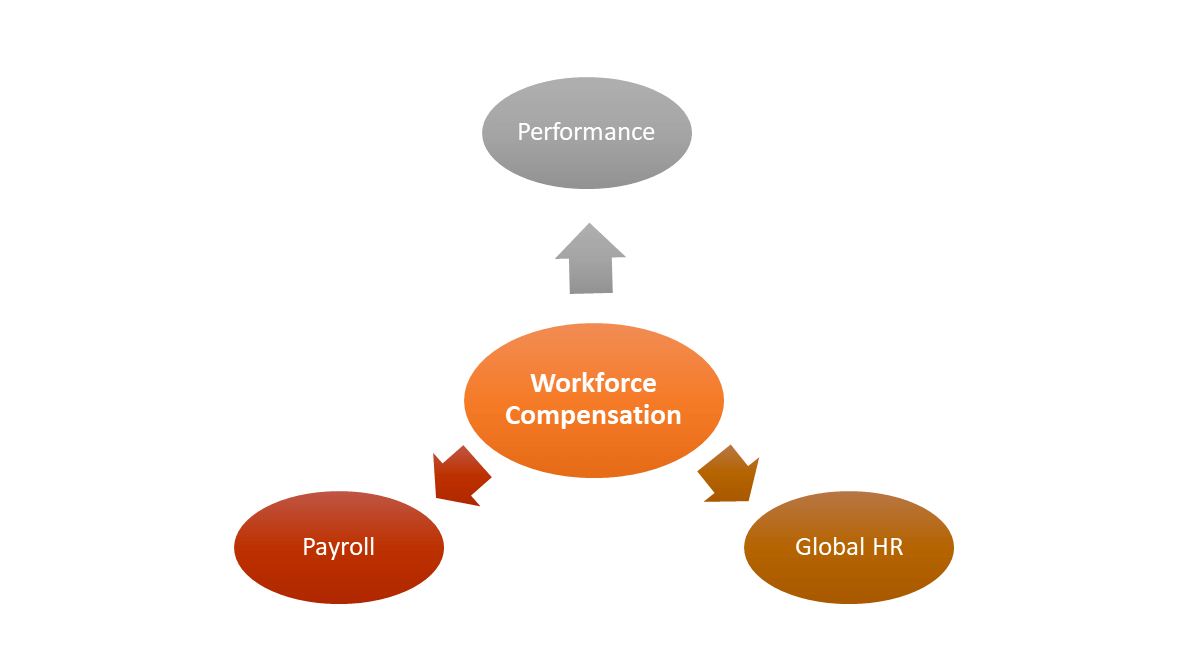
-
Simplified UI & ease of navigation:
The module provides a consolidated and global compensation view with simplified landing pages for the managers. The compensation budgets roll up and down through the organization, giving the managers easy access to all the required information. Managers can drill down into performance and compensation histories of their employees which will equip them to make better decisions. The intuitive spreadsheet style worksheets and notifications/alerts help managers to save time.
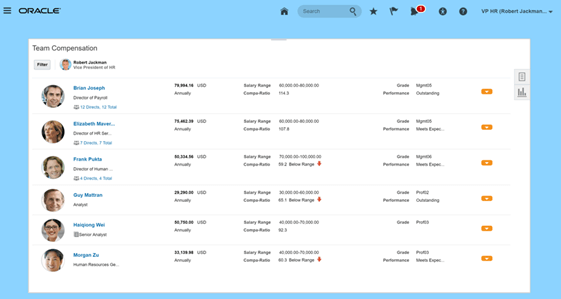
-
Communicating Total Rewards:
Employees can view their total rewards and compensation statements year-round through the Employee Self-service portal. Administrators/Managers can also generate and distribute compensation letters to the employees at the end of the compensation cycle. These letters are fully configurable to reflect your organization’s branding and messaging to help optimize employee engagement.
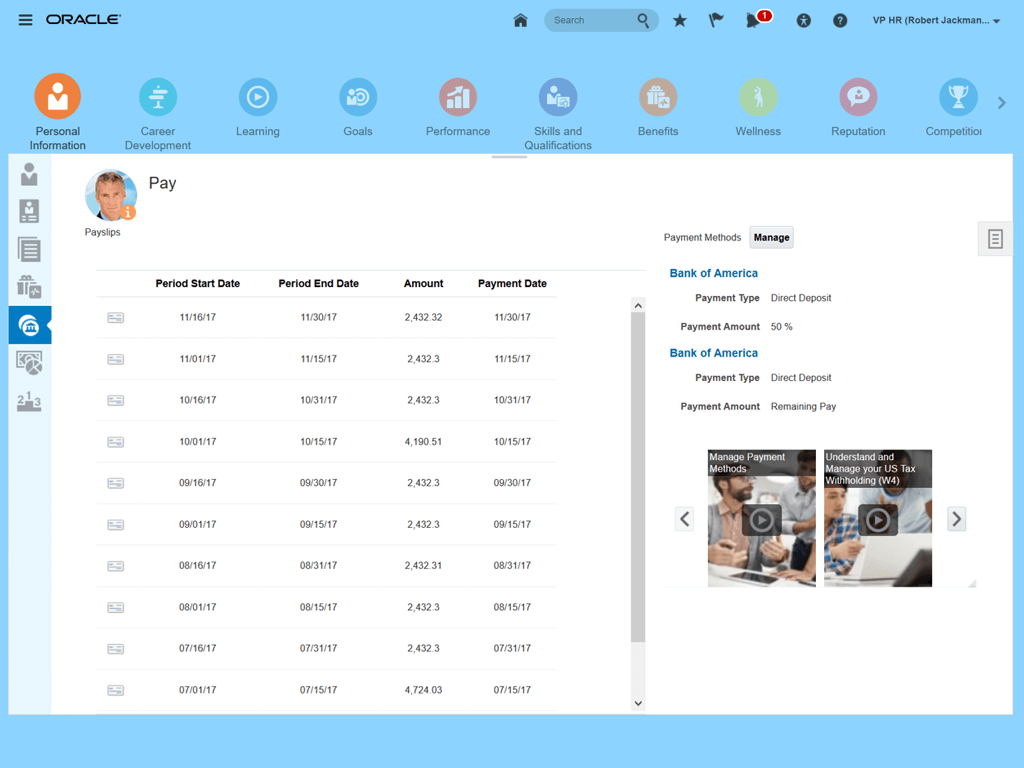
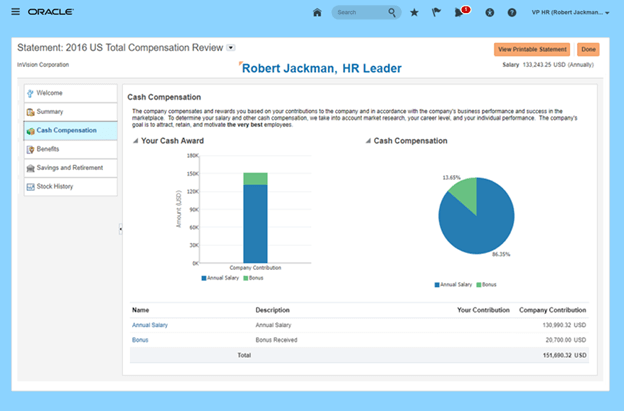
HR processes, but will also enforce compensation business rules globally. With actionable insights, it supports your managers to take informed decisions. Through automation, it enables workforce agility and rapid decision making.
These will eventually result in better employee engagement, retaining the best talent and definitely huge amounts of cost savings by eliminating operational inefficiencies.
Getting Started
Get started with Hexaware’s fixed fee based Oracle HCM Cloud implementation in the easiest ways. We are an award winning partner and these fixed-fee based implementation packages are designed for driving your overall HR transformation agenda. Take a quick tour of our Oracle HCM Cloud implementation services to learn more about these packages.
Read and learn more from some of our Oracle HCM Cloud implementation client testimonial and case studies across many industries such as Professional Services, Health Care, Higher Education, Online Retailers and more.
Related Blogs

Why AI and Automated Workday Testing Will Be Essential for Businesses in 2025
- Enterprise Platform Services

Workday Post-Go-Live Testing: Why It’s Critical for System Stability
- Enterprise Platform Services

SAP S/4HANA Migration Strategy: Brownfield vs. Greenfield vs. Hybrid Approach
- Enterprise Platform Services

S/4HANA Implementation Best Practices: Lessons from Enterprise Deployments
- Enterprise Platform Services

SAP Databricks: Transforming ERP Challenges into Opportunities
- Enterprise Platform Services

7 Reasons for Shifting Your Legacy ERP to the Cloud
- Enterprise Platform Services

Maximizing Business Growth Through RISE with SAP
- Enterprise Platform Services

5 Key Phases in Your SAP Implementation Journey
- Enterprise Platform Services

Seven Tips for Selecting the Right Oracle ERP Cloud Implementation Partner
- Enterprise Platform Services

6 Phases to a Successful Oracle ERP Cloud Implementation
- Enterprise Platform Services

Ready to Pursue Opportunity?
Every outcome starts with a conversation







